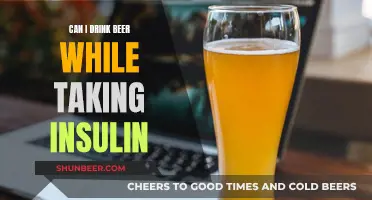
Alcohol can impact the blood sugar levels of people with diabetes, increasing their appetite and reducing the effectiveness of medication. It can also cause hypoglycaemia, a condition where blood sugar drops below 70 milligrams/deciliter, leading to headaches, irregular heartbeat, anxiety, confusion, and even seizures. Alcohol can also affect the body's ability to regulate blood sugar, especially if consumed without eating. Therefore, it is recommended that people with diabetes drink in moderation, only when their blood sugar levels are well-managed, and preferably with a meal or snack containing carbohydrates.
Beer and wine, two of the most popular alcoholic drinks, have different impacts on blood sugar levels due to their varying carbohydrate and sugar content. Light beers contain 3-6 grams of carbs per serving, while non-light beers contain 10-15 grams. Red wines typically have less than 5 grams of carbs per serving, whereas dessert wines contain approximately 14 grams. Thus, it is crucial for people with diabetes to understand the risks associated with drinking and how their specific condition may be affected by different types of alcohol. Consulting a doctor before consuming alcohol is always a good idea.
| Characteristics | Values |
|---|---|
| Alcoholic drinks | Beer, wine, spirits |
| Alcohol content | Beer: 4-7% |
| Wine: 12-15% | |
| Spirits: 40% | |
| Carbohydrates | Beer: 3-15g per serving |
| Wine: 0-14g per serving | |
| Spirits: very low | |
| Calories | Alcohol: 7 per gram |
| Carbohydrates: 4 per gram | |
| Fat: 9 per gram | |
| Risks | Hypoglycaemia, hyperglycaemia, weight gain, increased blood pressure, nerve damage, eye damage, liver damage |
| Interference with medication | |
| Advice | Drink in moderation, with food, and monitor blood sugar levels |
What You'll Learn

Alcohol can cause hypoglycaemia in diabetics
Alcohol can cause hypoglycaemia in people with diabetes. Hypoglycaemia is a condition where your blood sugar levels drop dangerously low, and it can have serious, even life-threatening, consequences. This is because the liver, which is responsible for regulating blood sugar levels, prioritises breaking down alcohol over releasing glucose into the bloodstream. This means that when you're drinking, your liver might not release enough glucose to keep your blood sugar levels stable, especially if you're not also eating food.
How Alcohol Causes Hypoglycaemia
The liver is the body's detoxification centre, breaking down toxins like alcohol so that the kidneys can flush them out. It's also responsible for regulating blood sugar levels by storing and releasing glucose into the bloodstream. However, the liver is not good at multitasking. When you drink alcohol, it prioritises breaking down the alcohol, which can lead to a drop in blood sugar levels. This is more likely to happen if you drink on an empty stomach or if your blood sugar levels are already low.
The Risks of Hypoglycaemia
Hypoglycaemia can be dangerous, especially for people with diabetes. Symptoms of hypoglycaemia include sweating, weakness, shakiness, nervousness, a pounding or racing heart, seizures, and coma. It can be difficult to tell the difference between someone who is experiencing hypoglycaemia and someone who is intoxicated, as they share many of the same symptoms, such as slurred speech, drowsiness, confusion, and difficulty walking. This makes it even more important to monitor blood sugar levels when drinking, especially for people with diabetes who are at a higher risk of hypoglycaemia.
Preventing Hypoglycaemia
If you have diabetes and want to drink alcohol, it's important to take precautions to prevent hypoglycaemia. This includes not drinking on an empty stomach, limiting the amount of alcohol consumed, drinking at a slow or moderate pace, and monitoring blood sugar levels throughout. It's also important to speak with your doctor about drinking, as they can provide guidance on how to drink safely and prevent hypoglycaemia.
Oregon's Deli Drinking Laws: Beer with Your Sandwich?
You may want to see also

The liver prioritises processing alcohol over releasing glucose
The liver is the body's glucose reservoir, storing and releasing it into the bloodstream to maintain healthy blood sugar levels. When we drink alcohol, the liver focuses on breaking it down instead of releasing glucose, which can cause blood sugar levels to drop. This is because the liver is unable to multitask and must prioritise processing alcohol over releasing glucose. This process takes between one to one-and-a-half hours per drink, during which time the risk of low blood sugar is increased.
The risk of low blood sugar is further multiplied with each additional drink consumed. Therefore, it is recommended that people with diabetes drink in moderation and only when their blood sugar levels are well-managed. It is also advised to drink alcohol with food, particularly carbohydrates, to reduce the risk of low blood sugar.
The liver's inability to multitask means that when alcohol is present in the system, it is less able to release glucose into the bloodstream, which can cause low blood sugar or hypoglycaemia. This is especially dangerous as the symptoms of hypoglycaemia can be confused with or masked by the effects of alcohol, such as flushing, nausea, increased heart rate and slurred speech.
DayQuil and Beer: A Safe Mix?
You may want to see also

Alcohol can affect medication effectiveness
Alcohol can affect how well your medication works. It can interfere with the positive effects of oral diabetes medicines or insulin. This is because alcohol prevents your liver from turning proteins and fats into carbohydrates when your body needs energy, such as during exercise or between meals.
The liver is the organ that stores and releases glucose (sugar) into your bloodstream. It does this between meals and while you sleep to help maintain healthy blood sugar levels. The liver is also in charge of breaking down toxins so they can be flushed out of your body by your kidneys. When you drink alcohol, the liver has a difficult time doing both of these jobs at the same time. It ends up breaking down alcohol instead of releasing glucose regularly. When this happens, your blood sugar levels aren't steady and can drop too low. This is even more likely to happen when you drink without eating any food.
Alcohol can also cause your blood glucose levels to rise or fall, depending on how much you drink. Some diabetes pills (including sulfonylureas and meglitinides) also lower blood glucose levels by stimulating the pancreas to make more insulin. Combining the blood-sugar-lowering effects of the medication with alcohol can lead to hypoglycemia or "insulin shock", which is a medical emergency.
If you take metformin to treat your type 2 diabetes, drinking alcohol can cause harmful and even life-threatening effects. Binge drinking or chronic heavy drinking while taking metformin can cause extremely low blood sugar levels, although other type 2 diabetes drugs, known as sulfonylureas, come with a much higher risk of hypoglycemia.
If you are taking medication for your diabetes, it is important to talk to your doctor about how alcohol may affect your condition management plan.
Andre's Unbelievable Beer Drinking Capacity
You may want to see also

Alcohol can increase weight gain
Secondly, alcohol stimulates your appetite and can lead to poor food choices. It can affect your judgment, causing you to overeat and disrupt your blood sugar control. This is especially true when drinking on an empty stomach, as it will make you feel tipsy more quickly and lead to eating or drinking more than intended.
Thirdly, alcohol inhibits your body from burning fat. When you drink alcohol, it is broken down into acetate, which your body will burn before any other calorie consumed or stored, including fat or sugar. Studies have shown that alcohol also temporarily inhibits "lipid oxidation", making it harder for your body to burn fat.
Finally, alcohol can lead to cravings for salty and greasy foods. Excess weight gained from alcohol consumption can contribute to the onset of type 2 diabetes and make the condition worse. Therefore, if you are trying to lose weight, reducing your alcohol intake is recommended.
The Intricacies of a Beer Exchange: Trading and Sampling
You may want to see also

Alcohol can cause hyperglycaemia
The impact of alcohol on blood sugar levels is particularly important for people with diabetes, as they already have elevated glucose levels. When drinking alcohol, people with diabetes should be cautious and take steps to prevent both hypoglycaemia and hyperglycaemia. Here are some recommendations:
- Drink in moderation: It is generally recommended that men should not consume more than two drinks per day, and women should not exceed one drink per day.
- Don't drink on an empty stomach: Food slows down the absorption of alcohol into the bloodstream. It is important to eat a meal or snack containing carbohydrates before drinking alcohol.
- Monitor blood sugar levels: Check your blood sugar levels before, during, and after drinking alcohol. This will help you manage your blood sugar levels and prevent them from dropping too low or rising too high.
- Be cautious with diabetes medications: Some diabetes medications may interact with alcohol and increase the risk of hypoglycaemia. Consult your healthcare provider to understand how alcohol may affect your medication.
- Choose low-sugar and low-carb beverages: Opt for drinks that are low in sugar and carbohydrates, such as light beers, dry wines, or spirits mixed with calorie-free mixers.
- Stay hydrated: Drink water or diet soda between alcoholic beverages to stay hydrated and help dilute the effects of alcohol on your blood sugar levels.
It is important to note that the effects of alcohol on blood sugar levels can vary from person to person. Other factors such as gender, height, and weight can also influence how alcohol affects blood sugar. Therefore, it is always a good idea to consult your healthcare provider to understand how alcohol may impact your specific condition and to determine what is safe for you.
CBD and Beer: Mixing Safety Concerns
You may want to see also







